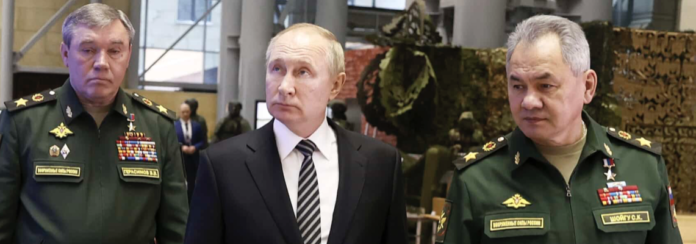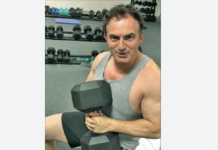This week there is an intense fight for Soledar, a small town about ten kilometres north-east of Bakhmut. Soledar’s salt mine is the largest in Europe, with a network of deep tunnels making it easy to defend and hard to attack. The area is useful for Russia because it provides a firm base from which to develop their attack on Bakhmut. South of Soledar is high ground that overlooks Bakhmut an area artillery observers can use to target the town’s defenders. Finally, securing Soledar provides an area close enough for Russian artillery to interdict supply lines on the M03 motorway that runs from Sloviansk to Bakhmut. At a tactical level capturing Soledar is a step forward for Russia because it makes the Ukrainian’s position in Bakhmut less tenable.
However, this battle tells us more about the situation in Russia politically and militarily. Particularly when combined with the recent change in Russia’s command structure. General Surovikin, appointed overall commander of Russian forces in Ukraine was suddenly removed from overall commence and replaced this week. The Kremlin announcing on 11 January that General Gerasimov, Russia’s most senior general will take command of the war in Ukraine. Surovikin, an air force officer will retain responsibility for the air campaign but will now be directly subordinate to Gerasimov.
Essentially, a number of political and military issues are coming to a head in Russia. In the Kremlin two factions are competing for supremacy. A faction led by Yevgeniy Prigozhin, Wagner Group boss and close friend of Putin’s. Prigozhin is a wildly ambitious entrepreneur and convicted criminal that through careful PR, violence and ruthlessness has built a private empire within Russia. An empire sanctioned by Putin. Prigozhin is a dangerous culmination of the same neo-liberal thinking that created the American private military economy; or that a free-market is always the best way to resolve a problem including fighting a war. However, unlike the West’s mercenary princes he exists in a world without legal governance. Prigozhin’s only limits being Putin’s patience. And; like any ambitious man he is working hard to increase his power.
The Prigozhin’s opposition are the strongmen of the military. Sergei Shoigu, defence minister and the Chief of Russia’s General Staff Gerasimov represent this faction. This faction represents what is left of sensible governance within Russia’s military. Traditionally, the military in Russia is a well-respected and proud institution that defeated the Nazi’s in World War Two, then kept NATO at bay for forty years. More recently it held the Russian Federation together defeating attempts to break away in Chechnya, Georgia and retaking Crimea in 2014.
In 2022 things changed, the Russian military’s invasion of Ukraine failed and continues to fail damaging its reputation with the Russian public. And; that is why Bakhmut is so important because it tests if Prigozhin can prevail where the military has failed. If he can; he demonstrates his military capability reinforcing his political power. He will have proved that Wagner Group is a better investment in war fighting than the existing military and that by extension he should be closer to Putin than the generals. Surovikin is a Prigozhin ally so probably supported the battle for Bakhmut providing logistics and artillery support, backing a politician on his way up.
Last Wednesday, simultaneous with the change in the Russia’s Ukrainian chain of command; Prigozhin announced that Soledar was captured. A claim refuted by Ukraine and not yet substantiated by the Kremlin.
This chain of events paints a clear picture of the tensions within the Russian chain of command. My assessment of the situation is that:
- Surovikin was appointed overall commander in Ukraine, probably supported by Prigozhin. Unification of command in Ukraine makes sense. However, it is likely that there was a degree of politicking and gerrymandering within the Kremlin to agree an appointment. It is credibly reported that Putin directly interferes in the campaign so the appointment is likely to have been highly contested and therefore a compromise between the factions.
- At the start of his tenure Surovikin made a brave decision by withdrawing from Kherson. Although tactically sensible, it is likely that this decision was only ratified by Putin after being presented a vision for victory that balanced the concession. Probably, taking Bakhmut and opening an axis of advance to Sloviansk and Kramatorsk; and a strategic bombing campaign to wipe out Ukraine’s civil infra-structure.
- Surovikin, supported Prigozhin’s push on Bakhmut. It is rumoured that Surovikin often bypasses Gerasimov and Shoigu liaising directly with Putin upsetting them.
- At this point Russia has withdrawn from Kherson, Bakhmut is still in Ukrainian hands and Ukraine is not battered into submission by Russia bombing its civil infrastructure.
- Surovikin’s time is up and Prigozhin’s statement about capturing Soledar is likely to be an attempt to retain some credibility demonstrating that the capture of Bakhmut is close.
Perhaps Gerasimov was playing a long-game; letting Prigozhin and Surovikin ‘front’ the unpopular but necessary withdrawal from Kherson then waiting off-stage until they had exhausted their goodwill. The key point is that Gerasimov is now the man in charge in Ukraine. The change in command relationships tips power in the Kremlin away from Prigozhin and back towards the military.
Putin likely expects immediate action from Gerasimov; and some commentators assess the change as a precursor to a significant Russian offensive. This may be the case because even though the Russian military appears spent Putin may not understand the situation; as the Institute for the Study of War pointed out recently
“Putin has repeatedly demonstrated he misunderstands the capabilities of Russian forces and has not abandoned his maximalist war aims in Ukraine. Putin may have appointed Gerasimov, the highest-ranking officer in the Russian military, to succeed a series of theater commanders to oversee a major offensive that Putin—likely incorrectly—believes Russian forces can accomplish in 2023.”
However, Gerasimov has a hard job ahead of him and he is very unlikely to be able to achieve any sort of significant offensive in the short-term because the Russian military is simply too broken. It lacks so many elements of an effective modern military that it needs to be rebuilt from the ground up to become effective. A warm winter in Europe means that the ground hasn’t frozen yet in Ukraine providing a longer than expected opportunity to rest and re-organise. Unfortunately for Gerasimov, he needs years rather than months to rebuild the Russian military.
Gerasimov may be a good enough leader to change the situation. However, it will not be by starting large offensives. Instead he must take control of the situation in Bakhmut and stop the drain on resources that Prigozhin’s ambitions create. Next, he needs to prepare for the coming Ukrainian offensive because if he can defeat it; Ukraine’s allies may reassess their support. The withdrawal from Kherson shortened the frontline and with new soldiers arriving at the front Russia may have the resources for a successful defensive battle. Defence is a better use of mobilised conscripts than making human wave attacks on Ukrainian positions. Perhaps, that is why Russian artillery is firing less in recent days? Saving ammunition?
In summary, we are seeing the internal struggles of Russia’s elite playing out in public; providing context for why so many bad decisions are made and so many Russian lives sacrificed. The fight for Bakhmut is politically motivated drawing in Russian resources and concentrating them in one place. A valid tactic in war is to draw the opposing side into a defensive battle – ‘fixing’ them in position while you manoeuvre elsewhere. Essentially, while the Russians send resources to Bakhmut fighting a battle for the sake of political power in Moscow we can rest assured that the Ukrainians are keen to encourage them so they can manoeuvre elsewhere. Russia’s lack of political cohesion and unity mitigating against success on the battlefield.
Gerasimov’s tenure will be interesting.
Ben Morgan is a tired Gen X interested in international politics. He is TDB’s Military analyst.





Gerasimov will not be allowed an operational pause because he will have gotten the job based on expectations of “turning things around”.
The Russian military’s current actions remind me of the old joke “We must do something. This is something, therefore we must do this”.
That said, the Russians are looking to mobilize an additional 500k men and whilst they won’t be quality troops, quantity has a quality of its own.
In the face of this, Ukraine will be ever more reliant on the US for toys which the US will happily provide to continue bleeding the Russian military to death.
If there are fewer than half a million men dead on each side by the end of this war, I will be pleasantly surprised.
In a blog I read yesterday an internal Russian source was quoted as saying the survival rate of the prisoner conscripts (who were given the deal of serving 6 months to get their freedom) is 0.28%. Thrown at the front, untrained and ill equipped, to die.
Keep them coming Ben.
Do you think 0.28% is likely to be accurate? That is a survival rate of 1 in 400. Much more likely to be 28%.
Agreed no way 0.28% can be correct.
Good assessment of the Russian, internal politics re the situation .
‘This may be the case because even though the Russian military appears spent’!!!!-yeah right.Just getting warmed up.
Ukraine is being destroyed ,it’s tragic and unnecessary.
More CIA talking points!
Ben, you missed the following
– TB outbreak within the Ukraine Military is destroying the Ukraine Military
– Ukraine Secret Police is still shooting Prisoners of War, and Ukraine people who speak Russian in the war zone
– Huge protests (not covered by Western media) by soldiers outside the Ukraine President Palace, due to poor conditions, and corruption
All my worry is used up today thinking about NZ/Ao. But something I notice intrigues me in this Russia-Ukraine confrontatation. The image of Putin has him nattily dressed in suit with impeccable white shirt and formal-looking tie. Whereas Zelensky always seem to be in fatigue-like olives. What does that convey to the world and their people? And anyway how come the western suit has become the clothing du jour for all men on the international stage except for group selfies after conferences?
I have been reading Regency novels and think that the men’s love of satin knee breeches for dress occasions and form-fitting coats and leggings that showed off their physique would be more pleasing than the almost uniform of business suits. Then there was their apparent fetish with how they arranged their neckerchiefs? Compare the t-shirt ubiquitous for the lumpenproletariat now, and jeans for all, with a worn look built into new jeans for extra cost.
Should we go back to duels, and showy uniforms of the –th Foot and let men who can’t get employment because of machines replacing them, satisfy their aggressions and love of uniforms in face to face battles. Cut out the distant missiles, clobber them face to face, short and sharp. It would be grander than dying in the gutter from drugs and depression.
Just something to think about as it seems we are in a regular cycle of war and peace, but the peace we return to tends to be only a piece of that previously.
Grey, Regency novels are marvelous for dress and social “niceties”. War and Peace gives the same era from a Russian view, not a business suite in sight. I donned the corporate Puritan gear for years, it all became obvious when I read Thorstein Veblen. His comparison of the social mores, rituals and dress of New Guinea natives and the wealthy of Guilded Era New York society is a classic. Have a minor Google and giggle.
Grey, What the difference in outfits tell you is that Zelensky takes very skilled advice from PR firms hired to put Zelensky in the best light possible and sell the need for billions of dollars of war aid to Capitol hill
The Russians on the other hand have never heeded that type of PR very seriously.
For modern times they are still hopelessly Soviet in their presentation .Either that or they couldn’t give a tuppeny wotsit for western opinion, that being a lost cause.
After very dull tv last night I enjoyed the intellectual work-out of Vexler’s utube today. He was examining Zeihan. It turns out he’s a generalist salesman with nowt to say really about this war. What do you think of these two?
Watched Vexler to see what you were on about. Vexler kept stopping, asking appropriate questions that never got answered. He’s commitment phobic so you end up none the wiser. Meanwhile Zeahan proved that he contends a lot with absolutely zero empirical evidence, what a gig. Tell them what they want to hear, get paid and famous. That was a wasted hour, but thanks.
Comments are closed.